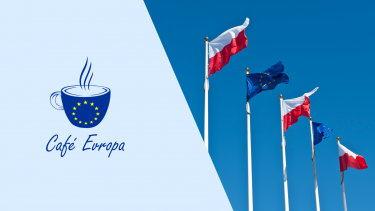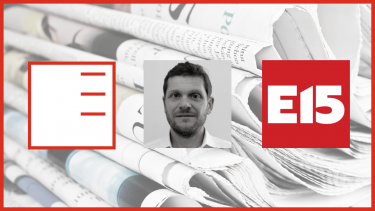iDNES.cz: Gas pipeline from Poland, oil pipeline from Italy. Czech Republic to borrow billions for projects
The Czech Republic wants to borrow tens of billions through the National Recovery Plan for projects such as the gas pipeline from Poland or the strengthening of the oil pipeline from Italy. The money will come from the European Recovery and Resilience Facility, which should make the loan profitable. Not all projects have been given the green light by the European Commission. Funding for the Dukovany hot water pipeline has been put on hold. Our Senior Research Fellow Vít Havelka commented on this topic.
Show more
POLICY PAPER | Gendering Europe’s Security and Recovery Responses to Ukraine
The policy paper, written by Míla O’Sullivan, illustrates that to centre the gender dimension and women’s voices in all aspects of Europe’s security and recovery responses to Ukraine are areas with the most serious gendered impacts and identifies the risks of gender-oblivious responses to Ukraine’s peaceful and sustainable future as well as to its European integration.
Show moreDeníkN: Global crises are increasing, the state is returning. However, Czech politicians ignore it
Commentary from our researcher Klára Votavová: The publication of the government's package for the recovery of public finances was preceded by several familiar claims about the exuberant Czech state and high taxes. After weeks of negotiations, Petr Fiala's government announced that it intends to save approximately 20 billion crowns on state operations and salaries for years 2024 and 2025. It is not yet clear who will be affected by the investigation and whether it will be in the form of layoffs or salary cuts for civil servants.
Show moreE15: The new Italian government must continue with reforms. Support for Ukraine in Rome will probably recede
One of our research associate, Alexandr Lagazzi, commented on the upcoming Italian elections for E15. According to pre-election polls, it can be assumed that the right-wing coalition led by Giorgia Meloni will win the elections. However, according to experts, this result could represent a significant risk for the Italian economy, the drawing of contributions from the EU and the supply of weapons to Ukraine.
Show more
INVITATION: A more sovereign European Union in the new geopolitical age? A first assessment after the French Presidency of the Council
We would like to invite you to a conference titled "A more sovereign European Union in the new geopolitical age? A first assessment after the French Presidency of the Council" on Tuesday 28 June at 11:00 CET online via ZOOM. The conference will be held in English. The event is organized by the Europeum Institute for European Policy, Austro-French Center, the Institut Montaigne, GLOBSEC, the French Embassy to Austria and the Austrian Society for European Politics.
Show moreINVITATION: Café Evropa online: Poland versus the EU - where is the Polish government heading?
We invite you to the first debate of the Café Evropa series of this year, this time on the topic: "Poland versus the EU - where is the Polish government heading?". The debate will take place on February 1st at 5:30 pm online on our Facebook page. What steps is the EU taking in relation to Poland and should it take tougher action? Wouldn't such a step interfere too much with national competences? What tools can the EU use against Poland and what role does the Polish National Recovery Plan play in this situation? How real is Polexit - Poland's withdrawal from the EU?
Show moreČRo Plus: France holds the EU presidency. Czech Republic wants to reform Schengen and move forward with asylum reform
The priorities of the French Presidency include the economic recovery of the Union after the pandemic, the climate agenda, European defence, relations with African countries and the Western Balkans. Our research fellow Vít Havelka also commented on the topic.
Show more
INVITATION: Eastern Partnership Summit 2021 as a new chapter of the EU-EaP relations: Time for diversification?
We would like to invite you to a debate entitled "Eastern Partnership Summit 2021 as a new chapter of the EU-EaP relations: Time for diversification?" The online debate will take place on December 14 at 17:30.
Show more
ČRo plus: Joe Biden's negotiations with Emmanuel Macron after the French-American diplomatic row and their further cooperation
Zdeněk Beránek, director of the EUROPEUM Institute for European Policy, spoke to Czech Radio about Joe Biden's European tour and his meeting with Emmanuel Macron for the first time since the diplomatic row over the cancelled delivery of French submarines to Australia. He explained what the agenda of their meeting was, i.e. how this row has affected French-American relations, but also how cooperation is taking place in the light of the rise of China, or on the topics of economic recovery and climate change.
Show more
E15: Dutch PM wants to take EU money away from Poland. He wants to freeze Dutch money from Poland
Zdeněk Beranek, Director of the EUROPEUM Institute for European Policy, commented for the news portal E15 on the statement of Dutch Prime Minister Mark Rutte on the rejection of the Polish National Recovery Plan. Poland would lose €36 billion, roughly CZK 914 billion, in EU funds. However, according to Zdeněk Beránek, such a scenario is not imminent.
Show more
Staroměstské náměstí 4/1
Prague 1 - Staré Město
110 00
tel.: +420 212 246 552
email: europeum@europeum.org
https://www.europeum.org









